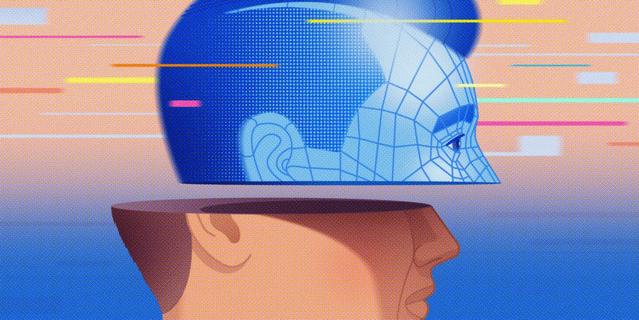The Future of Everything covers the innovation and technology transforming the way we live, work and play, with monthly issues on transportation, health, education and more. This month is Well-Being, online starting Jan. 6 and in print Jan. 13.
Is the metaverse good or bad news for our mental health? Silicon Valley’s focus on creating an immersive virtual world where our avatars shop, socialize and work has psychologists and other experts considering what effects it will have on our well-being.
Technology companies including Nvidia Corp., Epic Games Inc., Microsoft Corp. and Meta Platforms Inc., formerly Facebook, are rushing to create their own worlds or the digital bricks needed to enable them. Their visions have yet to take shape, but they could look something like a more sophisticated version of the computer-generated world Second Life, powered by technologies such as virtual and augmented reality and incorporating elements of gaming, remote work and social media. Headset-wearing users could attend concerts, participate in meetings or go on a class trip to Rome, for instance.
Newsletter Sign-up
The Future of Everything
A look at how innovation and technology are transforming the way we live, work and play.
SUBSCRIBESome tech and mental-health experts say that every new technology—from radio to television to videogames—sparked fears that it would untether users from reality, isolate them or make them violent. These concerns were largely unfounded, they say, pointing to research showing that genetics, socioeconomic contexts and other factors influence people’s well-being more. The metaverse, they say, is no different—it is only a matter of time before we seamlessly integrate it into our lives. Others, however, argue that the metaverse is so revolutionary that it will alter the fabric of society, with profound consequences for our mental health.
Here, five experts weigh in.

The Challenge Of a ‘Perfect’ World
What no one studies are the kinds of long-term impacts on people spending time in a world where everything’s perfect. You’ve got people who are struggling in their daily lives, looking at the social media platforms, and they’re comparing themselves to the other people. But at least in social media, it has to match up to who you are in the world. In VR, you lose that constraint. There’s less ability to create an accurate version of oneself in the metaverse than there is on the social media platforms, and where the skew is towards better-looking, idealized avatars. The challenge is going to be when people are spending a lot of time there, and they’re in a world in which everyone is just perfect and beautiful and ideal. How does that downstream affect one’s own self-esteem? No one knows the answer to that.
—Jeremy Bailenson, founding director of Stanford University’s Virtual Human Interaction Lab
Potential Positives of Screen Time
SHARE YOUR THOUGHTS
What do you think the metaverse will mean for you? Join the conversation below.
The overarching assumption is that we’ll all inevitably become “sucked in” to a virtual world, and want to spend more of our time there than in the offline world. I don’t think that’s a given, but it’s nevertheless important that tech companies take a thoughtful and ethical approach to developing metaverse technologies, rather than just go full-speed trying to develop what currently seem like fantastical ways of interacting with each other digitally. Something that I think often gets lost in the narrative around screens and digital technology is that they can be a tremendous force for good in terms of keeping us connected. Of course, there are serious questions to ask about how that can go wrong, and how harmful interactions and content can proliferate. But we shouldn’t just focus on the negatives, otherwise we will miss a tremendous opportunity.
—Peter Etchells, professor of psychology and science communication, Bath Spa University
Context Is Key
There are some fundamental building blocks of mental health that are well established, and they include things like positive relationships, social support, healthy sleep, physical activity. When we look at any technology, whether it’s new or established, the question is not to ask how much time are people spending on it, but rather to say, is the way people are using it going to either promote those mental-health goals or is it going to inhibit? A young person who may be LGBT and who finds an online context where they can feel a sense of social support—we would predict that that would be a benefit for their mental health. On the other hand, if using metaverse technologies replaces non-online behaviors that are healthy and supportive to mental health, like appropriate exercise, engagement in relationships in real life, healthy sleep, time spent in natural environments, then they can be harmful. [These technologies are] going to accelerate the good things about social connection and potentially the harmful things.
—Nick Allen, professor of clinical psychology, University of Oregon
Will the Kids Be Alright?
We’ve seen that young people are early and enthusiastic adopters of new technology. A lot of the effects [of the metaverse] are going to depend on how mindful we are, as adults, as technology developers, policymakers, educators, at scaffolding that youth in a way that we know promotes positive development. The problem we run into so far is that these platforms have not been designed with their safety in mind or their development only. I would expect that the same will be true of the metaverse. One of the biggest things that we see is it’s not so much the technology itself that is harmful, but the anxiety, the conflict it creates within families, within people’s perceptions that it’s harmful. The more rapidly this all develops, the higher the anxiety is going to be among parents. To reduce the conflict and anxiety, there’s going to have to be purposeful design and attention paid to what will be a huge share of young users in these new settings.
—Candice Odgers, professor of psychological science, University of California, Irvine
The Danger Of Preferring Virtual Life
In terms of the research there, the internet is not an isolating place, generally speaking. The activities we do on the internet, whether it’s social networking or playing online games, are highly social, even if you’re not directly interacting with other people. I don’t expect that this would be any different in the metaverse. But I’m concerned about a lack of balance. It’s possible to start to prefer engaging in virtual spaces because of the accommodations that they provide. As an avatar, I can be tall and skinny, I can be whatever I want. And if we start to shift into preferring a virtual life, that may then negatively impact our ability to engage in a non-virtual life, whether it’s self-confidence or belonging or social anxiety.
—Rachel Kowert, research director at Take This, a nonprofit focused on mental health in the videogaming community.
Interviews have been condensed and edited.
Copyright ©2022 Dow Jones & Company, Inc. All Rights Reserved. 87990cbe856818d5eddac44c7b1cdeb8




